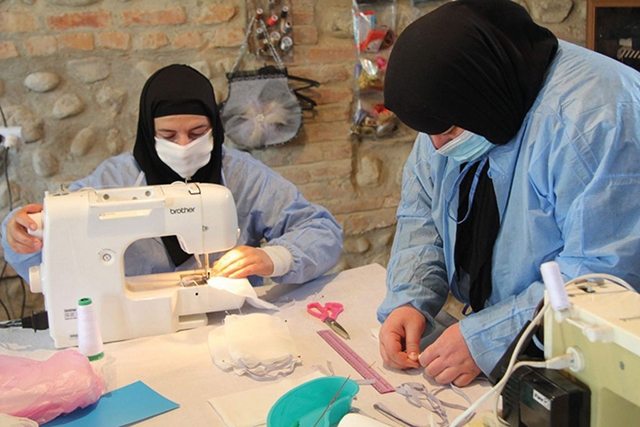EU-Supported Sewing Workshop, Run by Nuns, Produces 5,000 Face Masks
In response to the crisis caused by the coronavirus pandemic, states and companies around the globe have stepped up to increase the production of medical masks. In addition to over eight factories in Georgia already producing medical masks, the European Union supported a sewing workshop in Dedoplistskaro municipality in Kakheti, at the Kviratskhovloba Convent in Mirzaani. The workshop, run by nuns, has produced 5000 face masks.
The nuns handed those masks to the Municipality City Hall to ensure that they are distributed to the people at risk, medical staff and those at the frontline of the fight against the pandemic.
“Due to the crisis situation, we decided to produce medical masks,” said Mother Ketevan. “They are in high demand and in a very short supply, not only in our municipality, but countrywide. Given the state of emergency, people find it difficult to purchase them. Our nunnery workshop produced 5000 masks within 10 days. The ultimate beneficiaries of our production are the residents of Dedoplistskaro municipality.”
To help reduce the risk of getting infected during the pandemic, the EU-supported Dedoplistkaro Local Action Group (LAG) announced a small grant competition back in early April. On the LAG’s decision, the EU grant, to the amount of 6,120 GEL, was awarded to the sewing workshop of the Kviratskhovloba Convent.
This is not the first time that the nuns have won a grant. In 2019, the nuns won their first EU grant when they took part in the competition announced by Dedoplistskaro LAG and organization HEKS/EPER within the framework of the EU’s ENPARD program. With EU support, the nuns built a sewing workshop and bought several sewing machines.
At the time, the sewing workshop aimed mostly at promoting tourism services in the municipality. The village of Mirzaani is home of the Museum of landmark Georgian 20th century primitive painter Niko Pirosmani, who only rose to international fame posthumously. Tourists often visit the Pirosmani Museum and the nearby monastery. The nuns’ workshop and its giftshop offer tourists handmade items and souvenirs inspired by traditional Georgian ornaments.
The nuns’ workshop also works to empower local women by giving them the opportunity to learn traditional handicrafts and become employed. They learn to embroider, sew, process felt, and make various handmade souvenirs in the Convent workshop. The items created by them are also sold in the nunnery shop, which gives local women economic benefit.
Increasing employment opportunities and thereby reducing poverty is one of the missions of the EU-supported projects in Georgia. The EU-supported ENPARD project ‘Promoting Citizen Engagement for Economic Development (PROCEED)’ is implemented by HEKS/EPER Georgia in partnership with the Biological Farming Association ‘Elkana’. The project aims to contribute to the diversification of the local economy in the Dedoplistskaro municipality of the Kakheti region.
The EU has been supporting agriculture and rural development in Georgia through the ENPARD program since 2013, with a total budget so far of EUR 179.5 million.
The nunnery’s involvement in the fight against the coronavirus shows that although many representatives of the Georgian Orthodox Church act to prove otherwise, some members of the Church take the social responsibility seriously.
By Nini Dakhndaridze
Image source: The European Union












